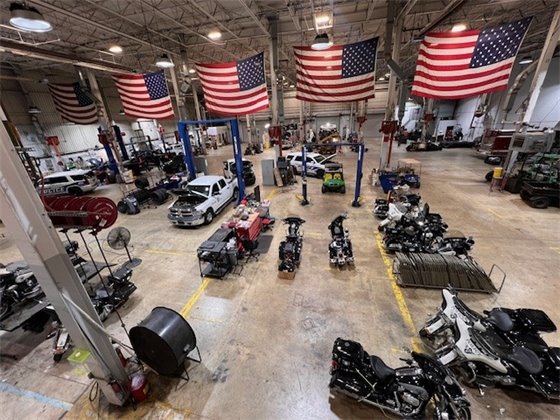On March 1st, 2019, the City of Hoover and the City of Pelham entered into a fleet maintenance agreement that has picked up steam over the last four years and is cruising into its fifth.
The groundbreaking agreement was arranged under Pelham Mayor Gary Waters and Hoover Mayor Frank Brocato.
“A lot is talked about regional cooperation, but we really put it into action with this agreement working with our neighboring city Pelham and it’s really been a great partnership,” says Brocato.
The five-year inter-local agreement says Hoover will perform maintenance and repair of all of Pelham’s fleet vehicles. In exchange, Pelham funds two mechanics to work on Hoover’s fleet staff.
“It’s going really well. It’s a win for both cities,” says Hoover Fleet Manager Dustin Moore.
He admits in the beginning, it was an adjustment for everyone. There were logistics and communication styles to learn. But the biggest hurdle was getting a good baseline and a good fleet health check on Pelham’s vehicles, Moore says, comparing the process to what a doctor and patient might go through upon first meeting.
“To get them where they needed to be at a baseline and to continue to get them where we need them to be, we checked the temperature of everything and got the physicals up and got the right medication prescribed and now we’re ready to go,” Moore says enthusiastically.
He does have some words of advice for other cities that might be considering a similar arrangement:
- Make sure both cities gain something from the process
- Consider the size of the fleet and equipment and determine whether it’s cost effective to have a facility and pay outsourcing costs
- Consider if the administrations of the cities are similarly aligned in terms of political stance which makes it easier to agree on terms and to build trust
- The proximity of the cities should be considered along with the brands of the vehicles. Different brands could extend the learning curve timeline
Moore applauds the foresight of Mayors Brocato and Waters, calling the agreement an intelligent decision.
“They saw a need and saw that it was a great opportunity to help both cities and it was a smart move. Nobody really thinks about fleet and vehicles a whole lot in taxpayer’s eyes, but it’s a big service to the taxpayers that they don’t ever really get to see or know about.”












